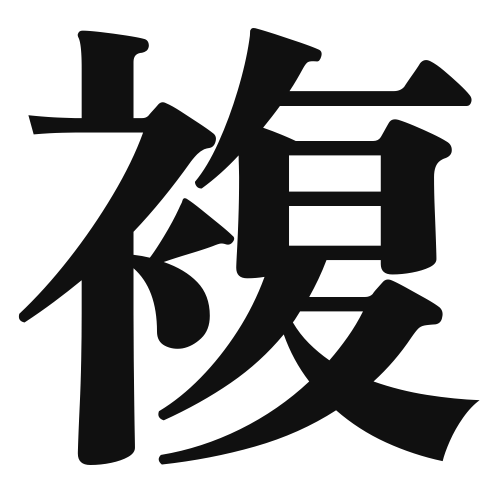1. Overview of Meaning
The kanji “複” (fuku) means “complex,” “duplicate,” or “multiple.” It conveys the idea of something being made up of various parts or layers, often indicating a sense of repetition or multiplicity.
2. Formation and Radical
Formation of the Kanji: The kanji “複” is a compound character (会意文字) that combines the radical for “cloth” (衣) with the character “复” (fuku), which means “to return” or “to repeat.” This combination suggests the idea of layers or multiple pieces of fabric.
Radical: The radical of “複” is “衣” (clothing), which often relates to garments or fabric in kanji characters.
3. Examples of Usage
Common Words and Phrases: Some frequently used words that include “複” are:
- 複雑 (ふくざつ, fukuzatsu) – complex
- 複製 (ふくせい, fukusei) – duplication
- 複数 (ふくすう, fukusuu) – multiple
Example Sentences in Daily Conversation:
- この問題は複雑です。 (このもんだいはふくざつです。) – This problem is complex.
- 彼はその絵の複製を作りました。 (かれはそのえのふくせいをつくりました。) – He made a duplicate of that painting.
4. Synonyms and Antonyms
Similar Kanji: A similar kanji is “重” (じゅう, juu), which means “heavy” or “multiple,” but it often emphasizes weight or importance rather than complexity.
Antonyms: An antonym is “単” (たん, tan), which means “single” or “simple,” indicating something that is not complex or is one-dimensional.
5. Cultural and Historical Background
Relation to Japanese Culture: The concept of “複” is significant in Japanese culture, especially in art and literature, where layers of meaning and complexity are often appreciated.
Proverbs and Idioms: One relevant idiom is “複雑怪奇” (ふくざつかいき, fukuzatsu kaiki), which means “complex and strange,” often used to describe intricate situations or phenomena.
